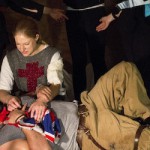story and photos by Cara Wilwerding
I enter the Lincoln Bike Kitchen to the sounds of a burbling creek and bleating goats.
They cascade down from the back of the venue, 20 feet up on a cabinet where director Ladd Wendelin sits, adjusting the volume. Trees made of scrap lumber, burlap and fake flowers litter the stage. Toy sheep lie at the foot of tall, wooden structures covered in white sheets, on which images of Joan of Arc are projected.
A few audience members lean against tool benches filled with wrenches, clamps, ratchets and screwdrivers. Light shines in through the open garage door and dims as audience members walk farther back into the room.
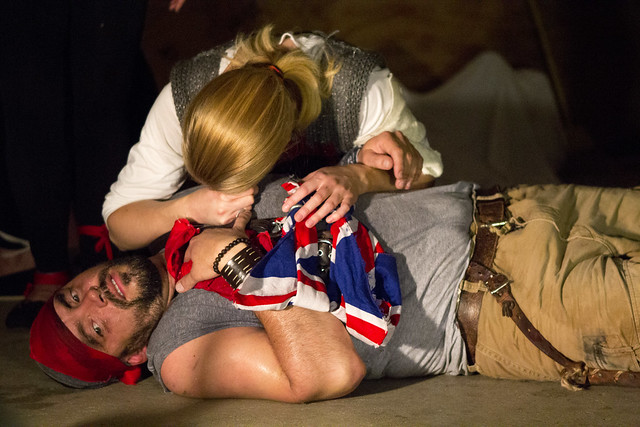
The scene is set at the bike kitchen for These Saints Will Burn, an offbeat play about the voices in Joan of Arc’s head, written by Robert Stewart with music by Brothers Family Temple and performed by ‘wet rats.’ I watched the story unfold on Saturday, June 15, the fourth of six total showings, which close this Friday and Saturday at 7:30 p.m. Chairs are $10, and carpet space is $5, with bike riders offered either seat for $5.
If the scene doesn’t seem refined, that’s how Stewart intended it to be. He wanted to take a historically accurate, yet comical approach to the tale of religion, war and injustice. Three saints often speak for Joan of Arc (Kate Running) as the story follows her through to her martyrdom. They protect her from misfortune and sometimes cause mischief.
Cast of These Saints Will Burn:
Kate Running as Joan D'Arc
John Wachter as Bastard R
Noelle Bohaty as St. Catherine & more
Katie Segrist as St. Sebastian & Jeaux the Crow & more
Angela Barber as St. Margaret & more
In the summer of 2012, Stewart departed from his previous fictional work — which includes a tale of boxing and a nine-month sitcom — to begin writing this account of Joan of Arc because he says most people know very little about her. What people remember, he says, is that she was burned at the stake. And that’s about it.
But she also led the French military during the Hundred Years’ War. She was a skilled seamstress. Comrades called her the Maid of Orléans for her famed defense of the French city of Orléans during the English siege of 1428. She felt more comfortable in men’s clothing, which made her an outcast in society. In prison for heresy, she played tricks on her tormentors. And these are only a few of the facts Stewart noted when describing Joan. He says the play can act as a jumping-off point to learn more.
flyers designed by Andrea Davis
Audiences might expand their vocabularies, too, as French words are interspersed throughout Stewart’s script, giving characters authority and making the setting feel genuine.
Joan’s animal sidekick, Jeaux the Crow (Katie Segrist), and tough guy Bastard R (John Watcher) offer comic relief with their natural-sounding French accents and flamboyant theatrics.
But with so much going on, diligent attention is crucial to understand minute allusions, such as a reference to the character of Charles Fromage as Chuck E. Cheese. Stewart’s joke combines the historical figure of King Charles VII with the French word for cheese, fromage, one of the handful of words in Stewart’s French vocabulary.
“It calls up a bit of the animatronic showman,” Stewart says. “A healthy dollop of the ol' razzle-dazzle with very limited substance underneath. You know, something for the kids.”
How a cult rock art band plays a supporting part
Levi Gerlach, keyboardist for Brothers Family Temple, says because the play is so dense, it’s hard to catch everything the first time. After playing music for the production four times already, Gerlach says he’s starting to pick up on Stewart’s subtleties. And now that they know the play well, the band is beginning to add subtleties of their own.
Most of their music and background noises are already sketched out, but the band also adds spontaneous extra bits to punctuate jokes or make serious events seem more dramatic. Sometimes the spirit of the scene needs reviving, trumpeter Dustin Rymph says.
“The actors get more into it with the music and that makes us play better,” guitarist Israel Cilio says. “Music makes the silent parts and the words much more powerful.”
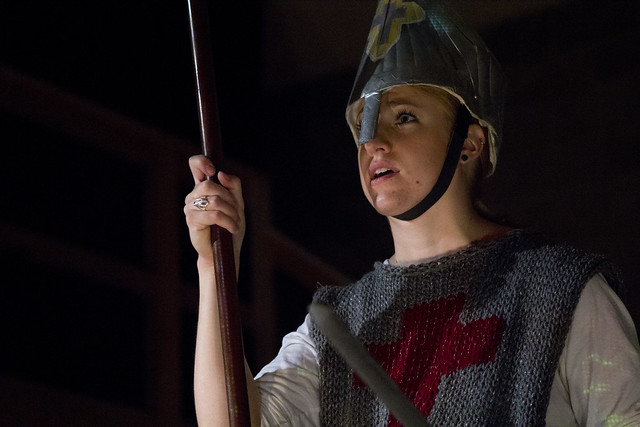
Music is all about character and individuality, say the Brothers Family Temple band members. Fortunately, they have a lot of both.
Cilio, Rymph, Gerlach, and additional member Joe Younglove typically play their shows in colorful robes and dark sunglasses. They perform their sets as one long song, with no breaks for commentary in between. It’s meant to be an experience, a celebration, Cilio says.
“For a band to succeed, especially here (in Lincoln), it’s got to have a really strong personality,” Cilio says. “It’s got to be attractive.”
Brothers Family Temple never plans to release any songs on albums. They’d rather focus on providing entertaining and quirky concerts, complementing their music with stagecraft such as serving cyanide Kool-Aid (without the cyanide) and Passover wafers to further their cult reputation.
courtesy photo
Rymph says the band’s abilities have improved since their conception in 2010. While their music started out being too busy and fast-paced, Rymph says they’ve learned how to play more calmly, slow things down and contemplate silence.
At times, this silence is essential for These Saints Will Burn, helping to augment the drama of the play’s serious moments, set alongside those toy sheep, fake flowers and trees made of scrap lumber: a scene at the bike kitchen that's an altogether new one, not only for the play but the venue itself, just weeks old.
How the Lincoln Bike Kitchen found a new home
Although it opened at this location on June 9, the bike kitchen began in Carol Smith’s empty two-bedroom house on 15th and Sumner. Smith had coordinated with Pepito Fierro of Pepe’s Bistro to open the the bike kitchen, a nonprofit, volunteer-based organization.
Bikes people weren’t riding would be stored in rooms people didn’t occupy. Eventually, though, the once-empty rooms filled to the brim. The shop overflowed with bikes and various parts speckled across the lawn and stacked throughout the unoccupied home.
And so, with little space to expand without leaving 15th and Sumner, the board of directors decided to rent a former gong shop. The crew built workbenches and bike stands, moved tools and began painting murals in what used to be Gong’s Unlimited on 1635 1st St.
The kitchen hosts open shop hours on Sundays, noon through 4 p.m. and Mondays 5 to 9 p.m., in addition to Women’s Night, which welcomes women and the transgender community on Tuesdays, 6:30 to 9 p.m.
These times are geared toward helping community members learn to fix bikes, inherently building a new community within the kitchen, says board member Nick Svoboda.
“During open shop hours, anybody is welcome to come in and if they need their bike worked on, there are volunteers here to help them,” Svoboda says.
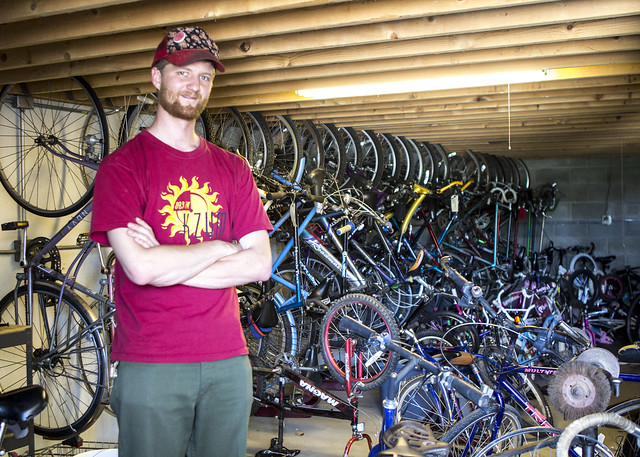
The philosophy is based on a give-and-take relationship, where attendants can use parts and tools free of charge, in turn for supporting the kitchen and keeping it alive. Volunteers can earn their own bike, free of charge, simply by volunteering for 20 hours.
And as events coordinator, Svoboda hopes to continue bringing theater, music and art to the Kitchen. He has plans to share rent with bands who can use the space for practices and rehearsals.
Gerlach says he’d like to host an art show at the kitchen soon, and he encourages other artists and musicians to take advantage of the open space as well. Both Gerlach and Svoboda noted the positive energy that reverberates throughout the concrete garage with high ceilings.
“Literally, the vibrations in here are good,” Svoboda says.
From gong shop employee to playwright
No wonder a part-time gong shop employee had dreamt of performing in that exact space.
While he worked, the employee imagined scenes progress on the top level, throughout the wide-open space below, or near the garage doorway. At home, the playwright wrote straight through to monotony, and then broke it by acting as a stagehand at the Lied Center or helping visual artists with some work. After toiling through a full year of writing, this former gong shop employee brought his play to the room he had envisioned.
Yes, Robert Stewart knew the space at 1635 1st St. before it was open as the bike kitchen. And the Lincolnite has produced plays in a wide array of other odd spots, too: friends’ basements, old bars and run-down churches, eventually giving his “scavenger theater” group a fitting name, the ‘wet rats.’
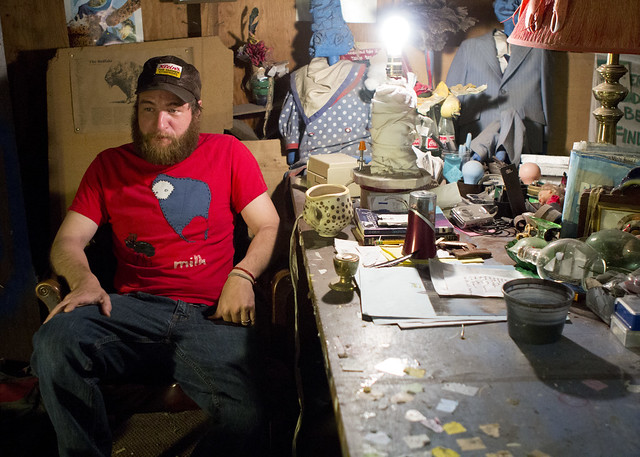
With little money coming in, the ‘rats’ embrace the idea of reusing and manipulating old materials to function as props, costumes and set design. Stewart said friends and family members donate items to him, and he’s constantly browsing thrift stores and eco stores in search of anything that looks interesting.
“The more that we work on stuff the more it makes sense because you think of these kind of going on under the surface,” Stewart says. “Collecting shiny objects and just this oddball assortment of items that sustain us. They make a new little world out of all these things.”
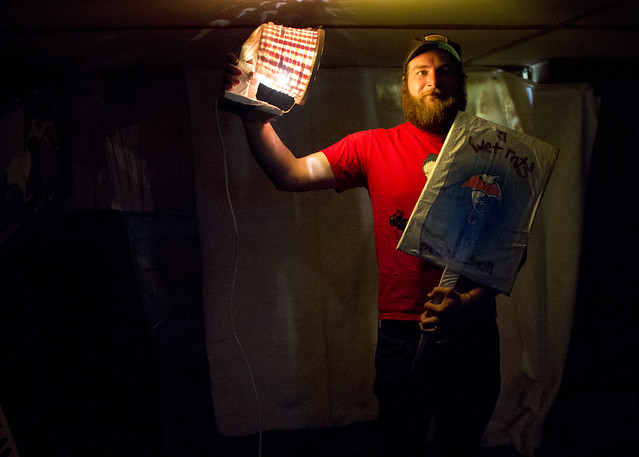
This little world began in Stewart’s basement, now a makeshift workshop for any play-related items. Baby dolls, back braces, wooden spoons and moon boots are scattered throughout the room where Stewart spends most of his time tinkering, as cast members rehearse upstairs. But none of this comes until after Stewart has a completed script. His favorite place to write is inside a small woodshed near the lake at his wife’s family cabin in Chickamaw Beach, Minn.
“There’s no internet, no cell reception, so it’s easy to get things done,” Stewart says.
After an initial writing spurt, Stewart will finish the rest at home.
“In general, some little image, phrase or anecdote will spark the idea and then it’s just three months of taking notes and mulling it over,” he says.
Because Stewart has been writing so consistently, his creative muscles have evolved. He was reluctant to rewrite anything at first, but Stewart has since found value in rearranging ideas. A work is never finished, he says.
After These Saints Will Burn, Stewart plans to start on a new play about medium spiritualists. He’ll return to Minnesota for inspiration.
Cara Wilwerding is a Hear Nebraska intern. She encourages you all to see the play, and hey, earn a free bike while you’re down there. Reach her at caraw@hearnebraska.org.




